牛津高中英语(Advance With English)模块一:少年的经验精品课件
2牛津高中英语模块一至四语法总结及练习(K12教育文档)

(完整word)2牛津高中英语模块一至四语法总结及练习(word版可编辑修改) 编辑整理:尊敬的读者朋友们:这里是精品文档编辑中心,本文档内容是由我和我的同事精心编辑整理后发布的,发布之前我们对文中内容进行仔细校对,但是难免会有疏漏的地方,但是任然希望((完整word)2牛津高中英语模块一至四语法总结及练习(word版可编辑修改))的内容能够给您的工作和学习带来便利。
同时也真诚的希望收到您的建议和反馈,这将是我们进步的源泉,前进的动力。
本文可编辑可修改,如果觉得对您有帮助请收藏以便随时查阅,最后祝您生活愉快业绩进步,以下为(完整word)2牛津高中英语模块一至四语法总结及练习(word版可编辑修改)的全部内容。
牛津英语模块1至模块4语法总结及练习第一单元一定语从句:定语从句的介绍1.就像是一个形容词或介词短语修饰名词一样,定语从句也可以修饰名词。
定语从句所修饰的名词称为先行词。
形容词:The green team介词短语:The team in green定语从句:The team who were wearing green2.定语从句通常由关系代词来引导,如which, that, who, whom, whose,或关系副词来引导,如when, where, why.关系代词可以在定语从句中担当主语,宾语,表语,定语;关系副词可以在定语从句中担当状语。
如:做主语The trees which are on the school campus have lost their leaves。
做宾语The student whom we saw just now is the best runner in our school.做表语Jack is no longer the lazy boy that he used to be。
做定语She has a brother whose name I can’t remember.做状语The school where he studied is in Shenzhen.二定语从句:关系代词:that,which,who,whom,和whose1.在定语从句中,that和which用来指代物。
牛津高中英语模块一知识点整理(打印)(K12教育文档)

(完整)牛津高中英语模块一知识点整理(打印)(word版可编辑修改)编辑整理:尊敬的读者朋友们:这里是精品文档编辑中心,本文档内容是由我和我的同事精心编辑整理后发布的,发布之前我们对文中内容进行仔细校对,但是难免会有疏漏的地方,但是任然希望((完整)牛津高中英语模块一知识点整理(打印)(word版可编辑修改))的内容能够给您的工作和学习带来便利。
同时也真诚的希望收到您的建议和反馈,这将是我们进步的源泉,前进的动力。
本文可编辑可修改,如果觉得对您有帮助请收藏以便随时查阅,最后祝您生活愉快业绩进步,以下为(完整)牛津高中英语模块一知识点整理(打印)(word版可编辑修改)的全部内容。
M1 U1 School Life一、词汇大集合I. 单词1。
attend 出席,参加2. assembly集会,会议3. earn 获得,赚,赚得4. respect 尊敬5。
achieve 取得,实现6. grade 学分,年级,等级7。
literature 文学8.average 一般的,平均的9。
challenging 具有挑战性的10. lunchtime午餐时间11。
e—mail 电子邮件,给...发电子邮件12。
title (书的)名称,题目13。
extra 额外的,外加的14。
cooking 做饭,烹饪15。
prepare 准备16。
drop 放弃17。
Spanish 西班牙语18。
German 德语,德国人19。
miss 思念,想念20. dessert (餐后的)甜点21. field 运动场,操场22。
experience 经历,体验23。
article 文章24。
penfriend 笔友25。
introduce 介绍26. immediately 立刻,马上27。
former 从前的,以前的28. recently 最近,近来29。
culture 文化30. develop 培养,养成31. photograph 照片,相片32. donate 捐献,捐赠33. gift 赠品,礼物34. display 陈列,展览35. kindness 好意,善意36. guest 客人,来宾37. speech 演说,演讲38. flat 套房39. bookcase 书橱,书柜40。
牛津高中英语模块1 Unit1 知识总结

Unit1 School lifeReading1. Going to a British high school for one year was a very enjoyable and exciting experience for me.experience n. 经验(不可数)经历(可数)vt 体验eg: Have you had any experience in this kind of work? 你对这工作有经验吗?The accident was a terrible experience to her. 那起事故对她来说是一次可怕的经历。
Jumping from the flying plane is an unforgettable experience.从正在飞翔的飞机上跳下来是一个难忘的经历。
He experienced the greatest hardship for the first time in his life.他体验到了他人生中的第一次的最大的困苦。
【拓展】by/from experience 凭经验experienced adj. 有经验的be experienced in/at (doing) sth 在…方面有经验an experienced doctor 有经验的医生eg: She is experienced in teaching.2. I was very happy with the school hours in Britain.be happy with= be pleased with 对……满意be happy to do sth 乐于做某事eg: They are happy with the result of the exam.I shall be happy to accept your invitation.3. This means I could get up an hour later than usual…mean doing sth 意味着做某事mean to do sth 打算做某事eg: If you miss this train, that will mean waiting for another 30 minutes.He meant to cause trouble. 他是存心惹麻烦4. On the first day……attended an assembly……attend vt. 出席,参加attend school/class/ a meeting/a lecture/ a wedding上学/上课/参加会议/听讲座/参加婚礼eg: Thousands of people attended the funeral. 数千人参加了葬礼。
牛津版高一英语模块一Units1-3知识点及语法复习
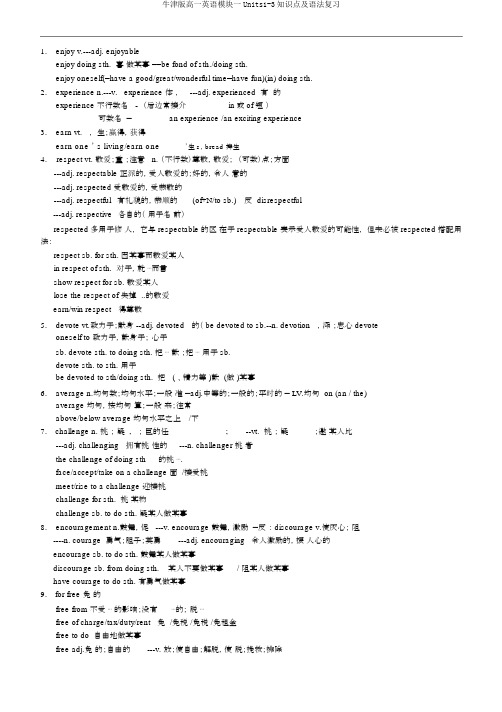
1.enjoy v.---adj. enjoyableenjoy doing sth. 喜做某事 ==be fond of sth./doing sth.enjoy oneself(=have a good/great/wonderful time=have fun)(in) doing sth.2.experience n.---v. experience 体, ---adj. experienced 有的experience 不行数名 -(后边常接介in 或 of 短)可数名—an experience /an exciting experience3.earn vt. ,生;赢得,获得earn one ’ s living/earn one’生s,bread持生4.respect vt. 敬爱;重;注意 n. (不行数)尊敬,敬爱;(可数)点;方面---adj. respectable 正派的,受人敬爱的;好的,令人意的---adj. respected 受敬爱的,受恭敬的---adj. respectful有礼貌的,恭顺的(of+N/to sb.)反disrespectful---adj. respective各自的(用于名前)respected多用于修人,它与 respectable的区在于 respectable 表示受人敬爱的可能性,但未必被 respected 搭配用法:respect sb. for sth. 因某事而敬爱某人in respect of sth. 对于,就⋯而言show respect for sb. 敬爱某人lose the respect of 失掉 ..的敬爱earn/win respect 得尊敬5.devote vt.致力于;献身 --adj. devoted 的( be devoted to sb.--n. devotion ,深;忠心 devoteoneself to 致力于,献身于;心于sb. devote sth. to doing sth. 把⋯献;把⋯用于 sb.devote sth. to sth. 用于be devoted to sth/doing sth. 把 (、精力等 )献 (做 )某事6.average n.均匀数;均匀水平;一般准—adj.中等的;一般的;平时的— LV.均匀 on (an / the)average 均匀,按均匀算;一般来;往常above/below average 均匀水平之上/下7. challenge n. 挑;疑 , ;巨的任;--vt. 挑;疑;邀某人比---adj. challenging拥有挑性的---n. challenger 挑者the challenge of doing sth的挑⋯.face/accept/take on a challenge 面 /接受挑meet/rise to a challenge 迎接挑challenge for sth. 挑某物challenge sb. to do sth.疑某人做某事8.encouragement n.鼓舞,促 ---v. encourage 鼓舞,激励—反: discourage v.使灰心;阻----n. courage 勇气;胆子;英勇---adj. encouraging令人激励的,振人心的encourage sb. to do sth. 鼓舞某人做某事discourage sb. from doing sth.某人不要做某事/阻某人做某事have courage to do sth. 有勇气做某事9. for free 免的free from 不受⋯的影响;没有⋯的;脱⋯free of charge/tax/duty/rent免/免税/免税/免租金free to do 自由地做某事free adj.免的;自由的---v.放;使自由;解脱,使脱;挽救;排除---adv. freely 自由地,不受限制地;通地---n. freedom 自由;自主10. look back on/upon sth.回,回look back on/upon the past 回顾去look back on/upon those years 回顾那些年look into;察look on 旁;,look out 注意,当心;注意看look up 找;好;向上看;敬爱;拜look down on/upon ,看不起look through ;仔看;而不look after 照;照看look for找look forward to (doing sth.)期望,期望look about 四看;观察事(1)As look back upon those years , I am struck by Annie's wisdom.< 回,回忆 >( 2)I've been looking into this matter this afternoon.<>( 3)Two men were fighting. The rest were looking on.< 旁 >(4)When you're eating fish , look out for bones.< 当心,当心 >(5)We've been looking out for a new house , but the ones we've seen are all too expensive.<留意找某物 >(6)Look up the word in the dictionary< ,找 >(7)I want to look my uncle up sometime.< 探望,拜 >(8)She looked through her notes before the examination.<>11. satisfaction n. 意— v. satisfy 使某人意;足要求等;切合准等---adj. satisfied 意的,足的反: dissatisfied---adj. satisfying令人高的,令人意的反: unsatisfying,物体,做主,一般极少用---adj. satisfactory 意的,好的,反: unsatisfactory ,常用,表示事物自己拥有的特色等be satisfied with sb./sth.⋯感觉意with/in satisfaction足地,意地to sb.’ s satisfaction使某人意express satisfaction with/at sth.⋯表示意give sb. the satisfaction of doing sth.使某人获得做某事的足感get/gain satisfaction from sth. 从某事物中获得足感12.exchange v.交,沟通,,更exchange sth. for sth.用某物某物exchange sth. with sb. 同某人交 /沟通某物in exchange for交13. What is⋯like?用于提某人或某物的状况怎么。
牛津高中英语模块1-5全部英语课文及中文翻译
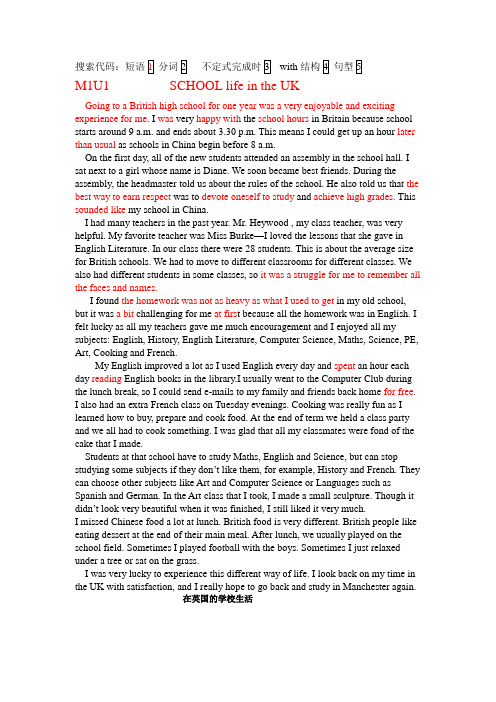
搜索代码:短语分词不定式完成时with结构句型M1U1 SCHOOL life in the UKGoing to a British high school for one year was a very enjoyable and exciting experience for me. I was very happy with the school hours in Britain because school starts around 9 a.m. and ends about 3.30 p.m. This means I could get up an hour later than usual as schools in China begin before 8 a.m.On the first day, all of the new students attended an assembly in the school hall. I sat next to a girl whose name is Diane. We soon became best friends. During the assembly, the headmaster told us about the rules of the school. He also told us that the best way to earn respect was to devote oneself to study and achieve high grades. This sounded like my school in China.I had many teachers in the past year. Mr. Heywood , my class teacher, was very helpful. My favorite teacher was Miss Burke—I loved the lessons that she gave in English Literature. In our class there were 28 students. This is about the average size for British schools. We had to move to different classrooms for different classes. We also had different students in some classes, so it was a struggle for me to remember all the faces and names.I found the homework was not as heavy as what I used to get in my old school, but it was a bit challenging for me at firs t because all the homework was in English. I felt lucky as all my teachers gave me much encouragement and I enjoyed all my subjects: English, History, English Literature, Computer Science, Maths, Science, PE, Art, Cooking and French.My English improved a lot as I used English every day and spent an hour each day reading English books in the library.I usually went to the Computer Club during the lunch break, so I could send e-mails to my family and friends back home for free.I also had an extra French class on Tuesday evenings. Cooking was really fun as I learned how to buy, prepare and cook food. At the end of term we held a class party and we all had to cook something. I was glad that all my classmates were fond of the cake that I made.Students at that school have to study Maths, English and Science, but can stop studying some subjects if they don’t like them, for example, History and French. They can choose other subjects like Art and Computer Science or Languages such as Spanish and German. In the Art class that I took, I made a small sculpture. Though it didn’t look very beautiful when it was finished, I still liked it very much.I missed Chinese food a lot at lunch. British food is very different. British people like eating dessert at the end of their main meal. After lunch, we usually played on the school field. Sometimes I played football with the boys. Sometimes I just relaxed under a tree or sat on the grass.I was very lucky to experience this different way of life. I look back on my time in the UK with satisfaction, and I really hope to go back and study in Manchester again.在英国的学校生活在英国上了一年的中学对我来说是一段非常令人愉快和兴奋的经历。
译林牛津版高中英语模块1教案全套2
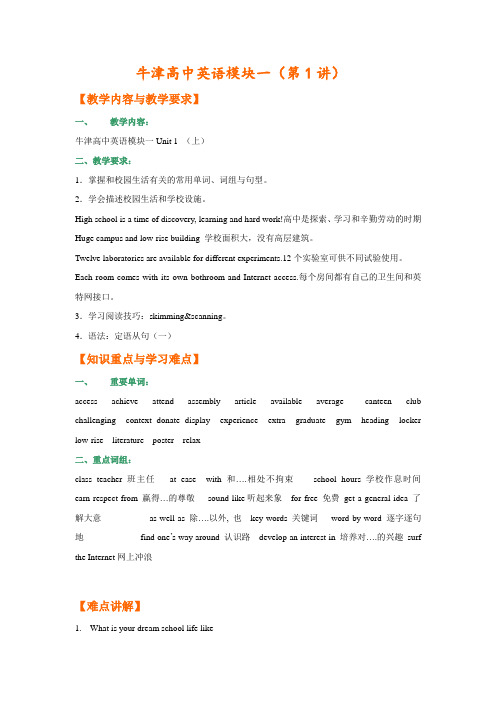
牛津高中英语模块一(第1讲)【教学内容与教学要求】一、教学内容:牛津高中英语模块一Unit 1 (上)二、教学要求:1.掌握和校园生活有关的常用单词、词组与句型。
2.学会描述校园生活和学校设施。
High school is a time of discovery, learning and hard work!高中是探索、学习和辛勤劳动的时期Huge campus and low-rise building 学校面积大,没有高层建筑。
Twelve laboratories are available for different experiments.12个实验室可供不同试验使用。
Each room comes with its own bothroom and Internet access.每个房间都有自己的卫生间和英特网接口。
3.学习阅读技巧:skimming&scanning。
4.语法:定语从句(一)【知识重点与学习难点】一、重要单词:access achieve attend assembly article available average canteen club challenging context donate display experience extra graduate gym heading locker low-rise literature poster relax二、重点词组:class teacher 班主任at ease with 和….相处不拘束school hours学校作息时间earn respect from 赢得…的尊敬sound like听起来象for free 免费get a general idea 了解大意as well as 除….以外, 也key words 关键词word by word 逐字逐句地find one’s way around 认识路develop an interest in 培养对….的兴趣surf the Internet网上冲浪【难点讲解】1.What is your dream school life like你理想中的学校生活是什么样子这里dream表示心目中最理想的. 如dream team (梦之队)。
高中英语词汇“三步联动”式教学之谈

高中英语词汇“三步联动”式教学之谈作者:周玲来源:《中学生英语·外语教学与研究》2013年第01期【摘要】本文从词汇的理解记忆的多元化,结合运用、规律化复习和课外阅读学习认知等步骤,在运用中阐述优化教学策略。
通过对上述三步联动的优化,在增强学生学习认知潜能基础上,能够使得学生的词汇积累和理解记忆更具有丰富性。
优化教学策略,能够为提高词汇和课程有效性教学奠定坚实基础,满足学生学习认知发展需要。
【关键词】高中英语词汇记忆理解众所周知,词汇是英语课程的重要组成部分,也是学生学习和运用英语语言知识的必备基础。
从词汇的词义理解记忆和灵活运用来分析教学方法,是提高学生学习运用能力的必然发展需要。
结合教学实践,运用“三步联动”的方法来优化词汇教学,能够在扩大学生词汇量的基础上,更能够培养学生词汇学习的主观能动性和激情,养成良好的英语学习思维习惯。
一、多方结合记忆,积累词汇量词汇是由26个字母构成,其组合方式可谓有多种。
学生因害怕背诵记忆,对于一些超过五个字母组合而成的词汇往往不太容易记忆。
这除了因为字母构成较多外,更重要的是学生没有掌握一定的记忆方法,仅是为了记忆词汇而记忆,容易陷入枯燥无味的境地。
教师不妨跳出单纯讲解词汇的教学圈子,利用多种方式来结合教学。
通过运用结合的形式来优化教学,能够让学生的词汇理解记忆不再受枯燥无味的字母排列顺序影响。
首先,结合单元词汇教学量要求,按照课程标准(实验稿)中的要求对3300个词汇和400-500个习惯用语或固定搭配进行分单元理解记忆。
其次,结合重点词汇进行优化理解记忆,可按照词性或者构词方法来优化组合,尤其是按照归类相似理解记忆,以强化认知感悟。
再次,结合一定语境学习来记忆词汇,要求学生能够按照一定的语句表达意义来进行理解记忆,让学生在具体运用过程中加深印象。
通过上述方面的结合来优化词汇教学,能够为学生初步了解和正确使用词汇奠定坚实的基础。
例如,在学习形容词的词汇时,可要求学生能够对以-ed结尾和以-ing形式结尾的形容词,结合固定搭配,像,be interested in ... 和an interesting ...等,让学生能够了解记忆以-ing形式结尾的形容词都表达“令人……的”,多表现事物本身的含义;而以-ed形式结尾的形容词则表达“感到……的”含义。
牛津高中英语模块一unit1词汇讲解

牛津高中英语模块一Unit1 重点词词组1. experiencen. (1) [C] 经历something that happens to you or something you do, especially when this has an effect on what you feel or think:1) This was my first experience of living abroad. 这是我第一次在国外生活的经历。
2) Failing an exam was a new experience for me. 考试失败对我来说是全新的体验。
(2) [U] 经验knowledge or skill that you gain from doing a job or activity, or the process of doing this:1) Experience is the best teacher. 经验是最好的老师。
2) I have some first-hand experience in skiing. 我有滑雪的第一手经验。
v. (1) 经历,体验,遭受to have a particular situation affect you or happen to youEveryone experiences these problems at some time in their lives 每个人在人生中的某些时刻都经历过这些问题。
(2) 感受,体会,体验to experience pain/pleasure/unhappiness 感受痛苦/愉快/不幸experienced adj. 有经验的an experienced teacher an experienced reporterbe experienced at/in +名词/doing something1) Jenny is experienced at teaching beginners. 珍妮在教初学者方面有经验。
提高中学生英语书面表达能力之我见

提高中学生英语书面表达能力之我见摘要在新课程高中英语教学中,依据学生的语言学习特点和表达需要,创新教学思维模式,运用多元化教学方法,不仅能够帮助学生积累丰富的语言文化知识,还能够提高学生的综合语言运用能力和学科综合素养。
学生书面表达能力的提高更是学生形成正确英语学习思维和语言感知的有效推动力。
关键词英语中学生表达能力《全日制义务教育普通高级中学英语课程标准(实验稿)》中认为,关注学生的语言表达能力,不仅能够培养学生正确的英语学习思维和语言感知,还能够为学生提供更为丰富的综合语言运用机会,促进他们英语知识和技能的有效内化生成。
在教学中,笔者发现,注重培养学生的书面表达能力,不仅能够达到上述教学目标要求,还能够提高他们的学科综合素养,满足他们学习发展需要。
在教学中,注重学生书面表达技能与其他的听、说、读等相配合教学,不仅能够在拓宽学生语言知识视野的前提下,提高他们的运用能力,还能够帮助学生极了丰富的写作表达素材。
在教学中,注重阅读积累,丰富表达素材;关注口语表达,提高表达思维;注重模拟训练,增强表达效果。
这些方法运用是提高学生书面表达的有效途径和方法。
一、注重阅读积累,丰富表达素材英语书面表达的基本就是要求学生能够在阅读理解文本内容的前提下能够广泛地占有丰富语言素材。
这也就是说,注重阅读积累,一方面,能够为学生的语言表达提供必要的物质基础,帮助他们进行写作;另一方面,能够拓宽学生的语言文化视野,更利于他们进行书面表达和运用。
笔者以为,注重阅读积累,教师应该注意以下几方面的指导:(一)多种方式阅读学习文本,鼓励学生运用默读、朗读等方式对文本内容进行理解感悟,以期帮助他们加深对文章内容的认识和了解。
(二)要求学生在自主阅读和主动探究的基础上能够运用自己的语言对文本内容进行概括。
(三)要求学生在阅读的过程中能够摘录出文章的主要信息,帮助学生养成归纳的学习习惯。
(四)建议学生在阅读学习的过程中能够对文本中的精彩之处予以摘抄,以便他们能够积累丰富的语言文化知识。
高中英语新高考-教材课文复习讲义:牛津模块1Unit 2单词语篇记忆和讲解(考前复习版)

高中英语新高考-教材课文复习讲义:牛津模块1Unit 2单词语篇记忆和讲解(考前复习版)一、短文朗诵Adolescence (1)carefully.随同青春期的到来是青少年的生理和心理的变化。
现在,我们迫不及待地去追寻独立和自由。
我们不再和父母聊天,这让他们困惑不安。
我们之间于是经常有冲突。
特别是争吵过后,我们会保持冷漠,坚持我们的要求被满足。
他们最终对我们加以限制。
个人之见,我们应该32. Everyone should be allowed freedom of choice.每个人都应享有自由选择的权利。
33. Local people are worried by the rise in crime.当地人因犯罪活动有所抬头而忧心忡忡。
34. Bad books do more harm to people than bad friends. 壞書比壞朋友害處更大。
35. It is clear that smoking is harmful to health.很明显,抽烟对健康有害。
36. It would be foolish of you to change your mind now. 现在改变主意非常愚蠢。
37. It takes time and patience to photograph wildlife. 拍摄野生动物要肯花时间,要有毅力。
38. It was selfish of him to leave all the work to you. 他把所有的工作都推给你,真是自私。
39. The time we spent together is now a distant memory. 我们一起度过的时光现已成为久远的记忆。
40. I was so annoyed with him for turning up late.他姗姗来迟,我很生气。
41. He is forbidden from leaving the country.他被限制出境。
牛津教材高一英语第一、二、三、四模块短语归纳
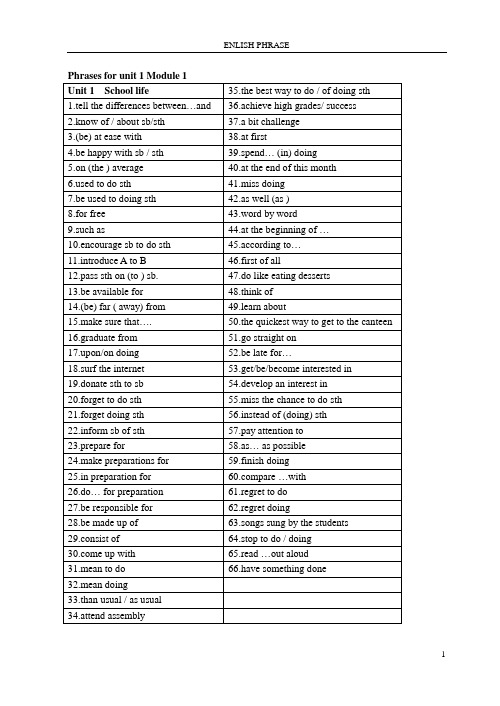
1.I’ll bring a torch with me so that I’ll be able to see in the dark.2.You have to wear special clothing just in case your raft gets turned upside down or sinks.3.We’ll try to get as close as possible to the animals, even though they’re dangerous.4.The weather report says that it will be raining when we arrive in London.5.As you can see, my schedule for June is full and I cannot go to London for the festival.kes , surrounded by vast grasslands, look like jewels.Sentences :p42.By the time we left, it was empty.Upon entering the tomb, Carter’s lucky pet bird was eaten by a snake.p43 If breathed in, the viruses can result in illness or even death.What is certain, though, is that the mystery of Tutankhamun’s tomb has never been fully explained.P58 Born in 1965, Yang Liwei has wanted to fly since he was young boy.The team spent the next five years being trained.It was his high scores on the psychological tests that finally won him his position as China’s first astronaut.Unit 1 Module 3。
高中英语 模块一 Unit 1 School life基础语法精讲 牛津译林版-牛津版高中全册英语试

Unit 1 School life关系代词引导的定语从句一、预备知识高中阶段,同学们将会学习三大从句:定语从句、名词从句和状语从句。
要学好这三大从句,首先就要熟悉句子的种类。
句子的种类按用途分有以下四种:陈述句肯定句We love our motherland. 否认句They don’t go to work on Sundays.疑问句一般疑问句①Are you a worker?②Haven’t you seen the film?特殊疑问句①Who is the man?②When do you watch TV?选择疑问句Do you want tea or coffee?反意疑问句①They are going to the airport,aren’t they?②You haven’t finished your homework,have you?祈使句肯定句Make sure to get there at eight.否认句Don’t worry.I’ll help you out.感叹句what+名词What great changes we have had these years!how+形容词或副词How hard they are working!how+句子How time flies!时间过得真快!How+adj.+a(an)+n.=What a(an)+adj.+nHow nice a boy (he is)!=What a nice boy (he is)!按结构分有以下三种:简单句主+谓They disappeared.主+谓+宾He likes swimming.主+谓+间宾+直接宾语They sent us a telegram.主+谓+宾+宾补They named the boy Jack.主+系+表①She is a university student.②He has become a pilot.并列句表并列关系and, not only…but also, neither…nor, both…and, not…but表转折关系but, while(而,尽管)nevertheless(然而,不过)等表选择关系or, otherwise, or else, either…or等表因果关系for, so, thus, therefore等注意:并列连词与从属连词的区别(从属连词引导的是状语从句)He was very tired, but he still worked on(并列句)=Although he was very tired, he still worked on.(复合句)复合句含有定语从句、名词从句或状语从句的句子二、根本概念1.定语从句的要素先行词:被定语从句所修饰的名词或代词,亦或是一个句子;关系代词或副词:引导定语从句的词;关系代词在从句中充当:主语、宾语、表语或定语等成分,而关系副词只可以充当状语。
牛津高中英语(模块一)(英语单词表)

牛津高中英语(模块一)(英语单词表,带发音)Unit 1enjoyable英音 [ɪnˈdʒɔɪəbl]美音 [ɪnˈdʒɔɪəbl]adj. 快乐的;有乐趣的;令人愉快的experience英音 [ɪkˈspɪəriəns]美音 [ɪkˈspɪriəns]n. 经验;经历;体验 vt. 经验;经历;体验assembly英音 [əˈsembli]美音 [əˈsembli]n. 装配;集会,集合headmaster英音 [ˌhedˈmɑːstə(r)]美音 [ˌhedˈmæstər]n. 校长earn英音 [ɜːn]美音 [ɜːrn]vt. 赚,赚得;获得,挣得;使得到;博得respect英音 [rɪˈspekt]美音 [rɪˈspekt]n. 尊敬,尊重;方面;敬意 vt. 尊敬,尊重;遵守devote英音 [dɪˈvəʊt]美音 [dɪˈvoʊt]vt. 致力于;奉献literature英音 [ˈlɪtrətʃə(r)]美音 [ˈlɪtrətʃər; ˈlɪtrətʃʊr; ˈlɪtərətʃʊr]n. 文学;文献;文艺;著作average英音 [ˈævərɪd ʒ]美音 [ˈævərɪd ʒ]n. 平均;平均数;海损 adj. 平均的;普通的;通常的 vt. 算出…的平均数;将…平均分…struggle英音 [ˈstrʌɡ(ə)l]美音 [ˈstr ʌɡl]n. 努力,奋斗;竞争 vt. 使劲移动;尽力使得vi. 奋斗,努力;挣扎challenging英音 [ˈtʃælɪndʒɪŋ]美音 [ˈtʃælɪndʒɪŋ]v. 要求;质疑;反对;向…挑战;盘问(challenge的ing形式) adj. 挑战的;引起…encouragement英音 [ɪnˈkʌrɪdʒm ənt]美音 [ɪnˈkɜːrɪdʒm ənt]n. 鼓励cooking英音 [ˈkʊkɪŋ]美音 [ˈkʊkɪŋ]n. 烹饪 adj. 烹调的 v. 烹调;筹划(cook的ing形式)for free免费地;免费的;为了免费extra英音 [ˈekstrə]美音 [ˈekstrə]n. 临时演员;号外;额外的事物;上等产品adj. 额外的,另外收费的;特大的 adv. 特别…fond英音 [fɒnd]美音 [fɑːnd]adj. 喜欢的;温柔的;宠爱的Spanish英音 [ˈspænɪʃ]美音 [ˈspænɪʃ]n. 西班牙语;西班牙人 adj. 西班牙的;西班牙人的;西班牙语的sculpture英音 [ˈskʌlptʃə(r)]美音 [ˈskʌlptʃər]n. 雕塑;雕刻;刻蚀 vt. 雕塑;雕刻;刻蚀 vi.从事雕刻dessert英音 [dɪˈzɜːt]美音 [dɪˈzɜːrt]n. 餐后甜点;甜点心look back na. 回头看;回顾;追想 (to;upon);(对事业等)不起劲look back on v. 回顾satisfaction英音 [ˌsætɪsˈfækʃn]美音 [ˌsætɪsˈfækʃn]n. 满意,满足;赔偿;乐事;赎罪surf英音 [sɜːf]美音 [sɜːrf]vi. 作冲浪运动 vt. 在…冲浪 n. 海浪,拍岸浪academic英音 [ˌækəˈdemɪk]美音 [ˌækəˈdemɪk]n. 大学生,大学教师;学者 adj. 学术的;理论的;学院的exchange英音 [ɪksˈtʃeɪndʒ]美音 [ɪksˈtʃeɪndʒ]n. 交换;交流;交易所;兑换 vt. 交换;交易;兑换 vi. 交换;交易;兑换former英音 [ˈfɔːmə(r)]美音 [ˈfɔːrmər]n. 模型,样板;起形成作用的人 adj. 从前的,前者的;前任的graduate英音 [ˈɡrædʒuət]美音 [ˈɡrædʒuət]n. 研究生;毕业生 adj. 毕业的;研究生的 vt.授予…学位;分等级;标上刻度 vi. 毕业;渐变fluent英音 [ˈfluːənt]美音 [ˈfluːənt]adj. 流畅的,流利的;液态的;畅流的painting英音 [ˈpeɪntɪŋ]n. 绘画;油画;着色 v. 绘画(paint的ing形美音 [ˈpeɪntɪŋ]式);涂色于donate英音 [dəʊˈneɪt]美音 [ˈdoʊneɪt]n. 捐赠;捐献 vt. 捐赠;捐献 vi. 捐赠;捐献kindness英音 [ˈkaɪndnəs]美音 [ˈkaɪndnəs]n. 仁慈;好意;友好的行为splendid英音 [ˈsplendɪd]美音 [ˈsplendɪd]adj. 辉煌的;灿烂的;极好的;杰出的independent英音 [ˌɪndɪˈpendənt]美音 [ˌɪndɪˈpendənt]n. 独立自主者;无党派者 adj. 独立的;单独的;无党派的;不受约束的make use of英音 [[meɪk juːz əv]]美音 [meɪk juːz əv]na. 使用title英音 [ˈtaɪt(ə)l]美音 [ˈtaɪtl]n. 冠军;标题;头衔;权利;字幕 adj. 冠军的;标题的;头衔的 vt. 加标题于;赋予头…dynasty英音 [ˈdɪnəsti]美音 [ˈdaɪnəsti]n. 王朝,朝代somehow英音 [ˈsʌmhaʊ]美音 [ˈsʌmhaʊ]adv. 以某种方法;莫名其妙地recent英音 [ˈriːsnt]美音 [ˈriːsnt]adj. 最近的;近代的professor英音 [prəˈfesə(r)]美音 [prəˈfesər]n. 教授;教师;公开表示信仰的人inform英音 [ɪnˈfɔːm]美音 [ɪnˈfɔːrm]vi. 告发;告密 vt. 通知;告诉;报告opening hours n. (商店、银行等的)营业时间run英音 [rʌn]美音 [rʌn]n. 奔跑;赛跑;趋向;奔跑的路程 vt. 管理,经营;运行;参赛 vi. 经营;奔跑;运转host英音 [həʊst]美音 [hoʊst]n. [计] 主机;主人;主持人;许多 vt. 主持;当主人招待 vi. 群集;做主人approve英音 [əˈpruːv]美音 [əˈpruːv]vi. 批准;赞成;满意 vt. 批准;赞成;为…提供证据charge英音 [tʃɑːdʒ]美音 [tʃɑːrdʒ]n. 费用;电荷;掌管;控告;命令;负载 vt.使充电;使承担;指责;装载;对…索费;…schoolmate英音 [ˈskuːlmeɪt]美音 [ˈskuːlmeɪt]n. 同学;同窗broadcast英音 [ˈbrɔːdkɑːst]美音 [ˈbrɔːdkæst]n. 广播;播音;广播节目 adj. 广播的 vt. 播送,播放;(无线电或电视)广播;播撒(…preparation英音 [ˌprepəˈreɪʃn]美音 [ˌprepəˈreɪʃn]n. 预备;准备event英音 [ɪˈvent]美音 [ɪˈvent]n. 事件,大事;项目;结果outing英音 [ˈaʊtɪŋ]美音 [ˈaʊtɪŋ]n. 远足;短途旅游;体育比赛 adj. 远足适用的 v. 出来;暴露(out的ing形式)graduation英音 [ˌɡrædʒuˈeɪʃ(ə)n]美音 [ˌɡrædʒuˈeɪʃn]n. 毕业;毕业典礼;刻度,分度;分等级poet英音 [ˈpəʊɪt]美音 [ˈpoʊət]n. 诗人generation英音 [ˌdʒenəˈreɪʃn]美音 [ˌdʒenəˈreɪʃn]n. 一代;产生;一代人;生殖literary英音 [ˈlɪtərəri]美音 [ˈlɪtəreri]adj. 文学的;书面的;精通文学的select英音 [sɪˈlekt]美音 [sɪˈlekt]n. 被挑选者;精萃 adj. 精选的;挑选出来的;极好的 vt. 挑选;选拔 vi. 挑选courtyard英音 [ˈkɔːtjɑːd]美音 [ˈkɔːrtjɑːrd]n. 庭院,院子;天井composition英音 [ˌkɒmpəˈzɪʃ(ə)n]美音 [ˌkɑːmpəˈzɪʃn]n. 作文,作曲,作品;[材] 构成;合成物;成分Unit 2act 英音 [ækt]美音 [ækt]n. 行为,行动;法令,法案;(戏剧,歌剧的)一幕,段;装腔作势 vt. 扮演;装作,…curtain英音 [ˈkɜːt(ə)n]美音 [ˈkɜːrtn]n. 幕;窗帘 vt. 遮蔽;装上门帘can't wait to dosomething无soccer英音 [ˈsɒkə(r)]美音 [ˈsɑːkər]n. 英式足球,足球frightened英音 [ˈfraɪtnd]美音 [ˈfraɪtnd]v. 害怕;使吃惊;吓走(frighten的过去分词) adj. 害怕的;受惊的;受恐吓的be supposed to na. …(在职务上)要;〈口〉不许bend 英音 [bend]美音 [bend]n. 弯曲 vt. 使弯曲;使屈服;使致力;使朝向vi. 弯曲,转弯;屈服;倾向;专心于starve英音 [stɑːv]美音 [stɑːrv]vi. 饿死;挨饿;渴望 vt. 使饿死;使挨饿cash英音 [kæʃ]美音 [kæʃ]n. 现款,现金 vt. 将…兑现;支付现款garbage英音 [ˈɡɑːbɪdʒ]美音 [ˈɡɑːrbɪdʒ]n. 垃圾;废物pizza英音 [ˈpiːtsə]美音 [ˈpiːtsə]n. 比萨饼(一种涂有乳酪核番茄酱的意大利式有馅烘饼)sink英音 [sɪŋk]美音 [sɪŋk]n. 水槽;洗涤槽;污水坑 vi. 下沉;消沉;渗透 vt. 使下沉;挖掘;使低落garbage can n. (常置于房外的)垃圾桶adult英音 [ˈædʌlt; əˈdʌlt]美音 [əˈdʌlt; ˈædʌlt]n. 成年人 adj. 成年的;成熟的tolerate英音 [ˈtɒləreɪt]美音 [ˈtɑːləreɪt]vt. 忍受;默许;宽恕behavior英音 [bɪˈheɪvjə]美音 [bɪˈheɪvjər]n. 行为,举止;态度;反应teenager英音 [ˈtiːneɪdʒə(r)]美音 [ˈtiːneɪdʒər]n. 十几岁的青少年;十三岁到十九岁的少年fault英音 [fɔːlt]美音 [fɔːlt]n. 故障;[地质] 断层;错误;缺点;毛病;(网球等)发球失误 vt. (通常用于疑问句…scene英音 [siːn]美音 [siːn]n. 场面;情景;景象;事件upset英音 [ˌʌpˈset]美音 [ˌʌpˈset]n. 混乱;翻倒;颠覆 adj. 心烦的;混乱的;弄翻的 vt. 使心烦;颠覆;扰乱 vi. 翻倒defend英音 [dɪˈfend]美音 [dɪˈfend]vi. 保卫;防守 vt. 辩护;防护emergency英音 [ɪˈmɜːdʒənsi]美音 [ɪˈmɜːrdʒənsi]n. 紧急情况;突发事件;非常时刻 adj. 紧急的;备用的anyhow英音 [ˈenihaʊ]美音 [ˈenihaʊ]adv. 总之;无论如何;不管怎样deserve英音 [dɪˈzɜːv]美音 [dɪˈzɜːrv]vi. 应受,应得 vt. 应受,应得explanation英音 [ˌekspləˈneɪʃ(ə)n]美音 [ˌekspləˈneɪʃn]n. 说明,解释;辩解clinic英音 [ˈklɪnɪk]美音 [ˈklɪnɪk]n. 临床;诊所hard英音 [hɑːd]美音 [hɑːrd]adj. 努力的;硬的;困难的;辛苦的;确实的;严厉的;猛烈的;冷酷无情的 adv. 努力…now that na. 由于rude英音 [ruːd]美音 [ruːd]adj. 粗鲁的;无礼的;狂暴的;未开化的sigh英音 [saɪ]美音 [saɪ]n. 叹息,叹气 vt. 叹息,叹气 vi. 叹息,叹气bicycle英音 [ˈbaɪsɪk(ə)l]n. 自行车 vt. 骑自行车运送 vi. 骑脚踏车美音 [ˈbaɪsɪkl]hardworking英音 [ˈhɑːdˌwɜːkɪŋ]美音 ['hɑrd,wɝkɪŋ]adj. 努力工作的;不辞辛劳的,苦干的 v. 努力工作(hardwork的ing形式)stay up na. 不去睡觉;不沉handle英音 [ˈhænd(ə)l]美音 [ˈhændl]n. [建] 把手;柄;手感;口实 vt. 处理;操作;运用;买卖;触摸 vi. 搬运;易于操纵error英音 [ˈerə(r)]美音 [ˈerər]n. 误差;错误;过失mix up英音 [ˈmɪks ʌp]美音 [ˈmɪks ʌp]na. 调匀;混淆;使结交坏朋友;【拳击】猛烈互击guidance英音 [ˈɡaɪdns]美音 [ˈɡaɪdns]n. 指导,引导;领导as if na. 彷佛;活像insist英音 [ɪnˈsɪst]美音 [ɪnˈsɪst]vi. 坚持,强调 vt. 坚持,强调DVD英音 [ˌdiː viːˈdiː]美音 [ˌdiː viːˈdiː]abbr. 数字化视频光盘(Digital Video Disk)cafe英音 [ˈkæfeɪ]美音 [kæˈfeɪ]n. 咖啡馆;小餐馆chat英音 [tʃæt]美音 [tʃæt]n. 聊天;闲谈 vt. 与…搭讪;与…攀谈 vi. 聊天;闲谈at present na. 目前argument英音 [ˈɑːɡjumənt]美音 [ˈɑːrɡjumənt]n. 论证;论据;争吵;内容提要freedom英音 [ˈfriːdəm]美音 [ˈfriːdəm]n. 自由,自主;直率worried英音 [ˈwʌrid]美音 [ˈwɜːrid]adj. 担心的harm英音 [hɑːm]美音 [hɑːrm]n. 伤害;损害 vt. 伤害;危害;损害foolish英音 [ˈfuːlɪʃ]美音 [ˈfuːlɪʃ]adj. 愚蠢的;傻的patience英音 [ˈpeɪʃ(ə)ns]美音 [ˈpeɪʃns]n. 耐性,耐心;忍耐,容忍selfish英音 [ˈselfɪʃ]美音 [ˈselfɪʃ]adj. 自私的;利己主义的distant英音 [ˈdɪstənt]美音 [ˈdɪstənt]adj. 遥远的;冷漠的;远隔的;不友好的,冷淡的annoyed英音 [əˈnɔɪd]美音 [əˈnɔɪd]v. 使烦恼;打扰(annoy的过去分词) adj. 恼怒的;烦闷的forbid英音 [fəˈbɪd]美音 [fərˈbɪd]vt. 禁止;不准;不允许;〈正式〉严禁adolescence英音 [ˌædəˈles(ə)ns]美音 [ˌædəˈlesns]n. 青春期along with na. 与…一道;以外misunderstand英音 [ˌmɪsʌndəˈstænd]美音 [ˌmɪsʌndərˈstænd]vt. 误解;误会normal英音 [ˈnɔːm(ə)l]美音 [ˈnɔːrml]adj. 正常的;正规的,标准的 n. 正常;标准;常态confused英音 [kənˈfjuːzd]美音 [kənˈfjuːzd]v. 困惑(confuse的过去式) adj. 困惑的;混乱的;糊涂的physical英音 [ˈfɪzɪk(ə)l]美音 [ˈfɪzɪkl]n. 体格检查 adj. [物] 物理的;身体的;物质的;根据自然规律的,符合自然法则的psychological英音 [ˌsaɪkəˈlɒdʒɪk(ə)l]美音 [ˌsaɪkəˈlɑːdʒɪkl]adj. 心理的;心理学的;精神上的tend 英音 [tend]vt. 照料,照管 vi. 趋向,倾向;照料,照顾Unit 3美音 [tend]limit英音 [ˈlɪmɪt]美音 [ˈlɪmɪt]n. 限制;限度;界线 vt. 限制;限定wisdom英音 [ˈwɪzdəm]美音 [ˈwɪzdəm]n. 智慧,才智;明智;学识;至理名言independence英音 [ˌɪndɪˈpendəns]美音 [ˌɪndɪˈpendəns]n. 独立性,自立性;自主balance英音 [ˈbæləns]美音 [ˈbæləns]n. 平衡;余额;匀称 vt. 使平衡;结算;使相称 vi. 保持平衡;相称;抵销last英音 [lɑːst]美音 [læst]n. 末尾,最后;上个;鞋楦(做鞋的模型)adj. 最后的;最近的,最新的;仅剩的;最…challenge英音 [ˈtʃælɪndʒ]美音 [ˈtʃælɪndʒ]n. 挑战;怀疑 vt. 向…挑战;对…质疑work out v. 作出;拟定;制定;计划一下slim英音 [slɪm]美音 [slɪm]adj. 苗条的;修长的;微小的;差的 vt. 使…体重减轻;使…苗条 vi. 减轻体重;变细figure英音 [ˈfɪɡə(r)]美音 [ˈfɪɡjər]n. 数字;人物;图形;价格;(人的)体形;画像 vt. 计算;认为;描绘;象征 vi. 计算;…ashamed英音 [əˈʃeɪmd]美音 [əˈʃeɪmd]adj. 惭愧的,感到难为情的;耻于……的weight-loss un. 失重;干耗;重量损失;体重减轻pill英音 [pɪl]美音 [pɪl]n. 药丸;弹丸,子弹;口服避孕药 vt. 把…制成丸剂;使服用药丸;抢劫,掠夺(古语) …kilogram英音 [ˈkɪləɡræm]美音 [ˈkɪləɡræm]n. 公斤;千克work英音 [wɜːk]美音 [wɜːrk]n. 工作;[物] 功;产品;操作;职业;行为;事业;工厂;著作;文学、音乐或艺术作品 …energetic英音 [ˌenəˈdʒetɪk]美音 [ˌenərˈdʒetɪk]adj. 精力充沛的;积极的;有力的recover英音 [rɪˈkʌvə(r)]美音 [rɪˈkʌvər]n. 还原至预备姿势 vt. 恢复;弥补;重新获得vi. 恢复;胜诉;重新得球liver英音 [ˈlɪvə(r)]美音 [ˈlɪvər]n. 肝脏;生活者,居民failure英音 [ˈfeɪljə(r)]美音 [ˈfeɪljər]n. 失败;故障;失败者;破产contain英音 [kənˈteɪn]美音 [kənˈteɪn]vi. 含有;自制 vt. 包含;控制;容纳;牵制(敌军)chemical英音 [ˈkemɪkl]美音 [ˈkemɪkl]n. 化学制品,化学药品 adj. 化学的treatment英音 [ˈtriːtmənt]美音 [ˈtriːtmənt]n. 治疗,疗法;处理;对待painful英音 [ˈpeɪnf(ə)l]美音 [ˈpeɪnfl]adj. 痛苦的;疼痛的;令人不快的damage英音 [ˈdæmɪdʒ]美音 [ˈdæmɪdʒ]vi. 损害;损毁 vt. 损害,毁坏 n. 损害;损毁;赔偿金attractive英音 [əˈtræktɪv]美音 [əˈtræktɪv]adj. 吸引人的;有魅力的;引人注目的embarrassed英音 [ɪmˈbærəst]美音 [ɪmˈbærəst]v. 使...困窘;使...局促不安(embarrass的过去分词形式) adj. 尴尬的;窘迫的pressure英音 [ˈpreʃə(r)]美音 [ˈpreʃər]n. 压力;压迫,[物] 压强 vt. 迫使;密封;使……增压overweight英音 [ˌəʊvəˈweɪt]美音 [ˌoʊvərˈweɪt]adj. 超重的;过重的 vt. 使负担过重 n. 超重diet英音 [ˈdaɪət]美音 [ˈdaɪət]n. 饮食;食物;规定饮食 vt. [医] 照规定饮食vi. 节食prefer英音 [prɪˈfɜː(r)]美音 [prɪˈfɜːr]vt. 更喜欢;宁愿;提出;提升 vi. 喜欢;愿意waist英音 [weɪst]美音 [weɪst]n. 腰,腰部suffer英音 [ˈsʌfə(r)]美音 [ˈsʌfər]vi. 遭受,忍受;受痛苦;经验;受损害 vt. 遭受;忍受;经历athlete英音 [ˈæθliːt]美音 [ˈæθliːt]n. 运动员,体育家;身强力壮的人effect英音 [ɪˈfekt]美音 [ɪˈfekt]n. 影响;效果;作用 vt. 产生;达到目的fall out v. 〈非正式〉吵架;争执;闹僵;分手affect英音 [əˈfekt]美音 [əˈfekt]n. 情感;引起感情的因素 vt. 影响;感染;感动;假装 vi. 倾向;喜欢achievement英音 [əˈtʃiːvmənt]美音 [əˈtʃiːvmənt]n. 成就;完成;达到;成绩post英音 [pəʊst]美音 [poʊst]n. 岗位;邮件;标杆 vt. 张贴;公布;邮递;布置 vi. 快速行进membership英音 [ˈmembəʃɪp]美音 [ˈmembərʃɪp]n. 资格;成员资格;会员身份including英音 [ɪnˈkluːdɪŋ]美音 [ɪnˈkluːdɪŋ]prep. 包含,包括branch英音 [brɑːntʃ]美音 [bræntʃ]n. 树枝,分枝;分部;支流 vt. 分支;出现分歧 vi. 分支;出现分歧downtown英音 [ˌdaʊnˈtaʊn]美音 [ˌdaʊnˈtaʊn]n. 市中心区;三分线以外 adj. 市中心的 adv.往闹市区;在市区freeway英音 [ˈfriːweɪ]美音 [ˈfriːweɪ]n. 高速公路midnight英音 [ˈmɪdnaɪt]n. 午夜,半夜12点钟 adj. 半夜的;漆黑的美音 [ˈmɪdnaɪt]equipment英音 [ɪˈkwɪpmənt]美音 [ɪˈkwɪpmənt]n. 设备,装备;器材get into shape为了健美的体形而进行锻炼等; 使有条理,恰当地安排…make the most of na. 充分使用;尽量使好[不好]看;极为重视;尽量称赞[贬损]marathon英音 [ˈmærəθən]美音 [ˈmærəθɑːn]n. 马拉松赛跑;耐力的考验 adj. 马拉松式的;有耐力的 vi. 参加马拉松赛跑expert英音 [ˈekspɜːt]美音 [ˈekspɜːrt]n. 专家;行家;能手 adj. 熟练的;内行的;老练的 vt. 当专家;在…中当行家chip英音 [tʃɪp]美音 [tʃɪp]n. [电子] 芯片;筹码;碎片;(食物的) 小片;薄片 vt. 削,凿;削成碎片 vi. 剥落;碎裂sadness英音 [ˈsædnəs]美音 [ˈsædnəs]n. 悲哀comfort英音 [ˈkʌmfət]美音 [ˈkʌmfərt]n. 安慰;舒适;安慰者 vt. 安慰;使(痛苦等)缓和useless英音 [ˈjuːsləs]美音 [ˈjuːsləs]adj. 无用的;无效的in the longtermna. 从长期看approximately英音 [əˈprɒksɪmətli]美音 [əˈprɑːksɪmətli]adv. 大约,近似地;近于skip英音 [skɪp]美音 [skɪp]n. 跳跃;跳读 vt. 跳过;遗漏 vi. 跳跃;跳绳;遗漏;跳读properly英音 [ˈprɒpəli]美音 [ˈprɑːpərli]adv. 适当地;正确地;恰当地mostly英音 [ˈməʊstli]美音 [ˈmoʊstli]adv. 主要地;通常;多半地system英音 [ˈsɪstəm]美音 [ˈsɪstəm]n. 制度,体制;系统;方法skin英音 [skɪn]美音 [skɪn]n. 皮肤;外皮 vt. 剥皮 vi. 愈合;长皮count英音 [kaʊnt]美音 [kaʊnt]n. 计数;计算;伯爵 vt. 计算;认为 vi. 计数;有价值peaceful英音 [ˈpiːsfl]美音 [ˈpiːsfl]adj. 和平的,爱好和平的;平静的concentrate英音 [ˈkɒns(ə)ntreɪt]美音 [ˈkɑːnsntreɪt]n. 浓缩,精选;浓缩液 vi. 集中;浓缩;全神贯注;聚集 vt. 集中;浓缩amount英音 [əˈmaʊnt]美音 [əˈmaʊnt]n. 数量;总额,总数 vi. 总计,合计;相当于;共计;产生…结果as a matter offactna. 事实上;事实是loss英音 [lɒs]美音 [lɔːs]n. 减少;亏损;失败;遗失gain英音 [ɡeɪn]美音 [ɡeɪn]n. 增加;利润;收获 vi. 增加;获利 vt. 获得;增加;赚到。
牛津译林版高中英语 各单元所有单词 精华讲解及拓展延伸 模块一 Unit One (上)
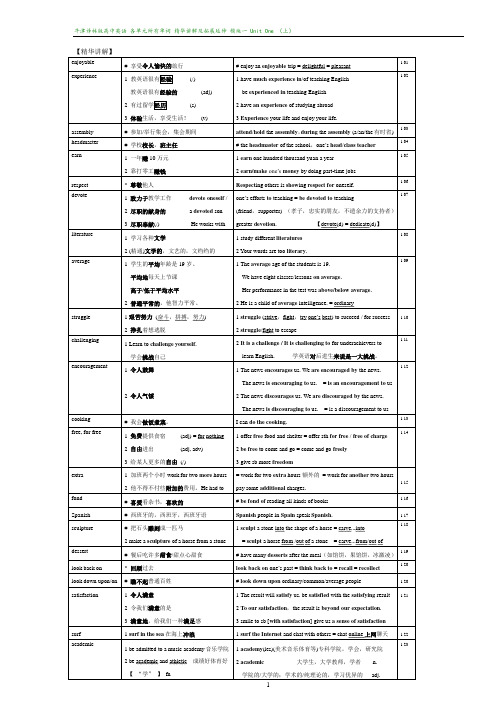
2 graduate from a college / a university 从大学毕业 1 speak fluent English = speak English fluently 2 speak perfect English = speak English perfectly 2 The painter painted the toy red with red paint and a paintbrush.
1.12 1.11 1.10 1.09 1.06 1.07 1.03 1.04 1.05 1.01 1.02
【devote(d) = dedicate(d)】
1.08
1 The news encourages us. We are encouraged by the news. The news is encouraging to us. = is an encouragement to us
2.02
画家/漆匠,把玩具油漆成红色,
用红漆和漆刷
2.03
1 donate/contribute the money to the disaster area 2 raise/collect money for the disaster area It’s kind of you to help others. Thank you for your kindness. a splendid idea/article/victory/sunset/house 2 Learn to be independent of parents. 独立于父母 1 make use of one‟s free time = use one‟s free time make good/full/little use of sth make the most/the best use of sth 2 Tell me __ (the use that, what use) he makes of his free time? This book talks about many topics, but the theme of all is “love”. (better/fuller/less)
译林版牛津高中英语模块一Unit1 of M1

Unit 1School life (SBI)I. Vocabulary:Task 1 Find a word from the first sentence and use its other form or part of speech to fill in the blank in the second sentence.1. I enjoy listening to music while doing my homework.Harry Potter is such an ____________ film that children all over the world love it.2. Marco Polo had many interesting experiences while traveling in China.Traveling from Beijing to Shanghai, you can get a close look at China. Just imagine all the different things you can _____________ on a ten-day tour.3. I’d like to do something that will really challenge me.Climbing Mount Qomolangma is a ______________ task to all mountain climbers.4. I will be able to e-mail you my writing at the end of this month.Don’t forget to check your ____________ as soon as you turn on your computer.5. We had a lot of fun at our English evening.The babysitter played a ___________ game with the little boy and made him laugh.6. I have just watched the weather report. It said there would be a big drop in temperature.I am going to ___________ Art this term and join the Woodwork class instead.7. Lily was excited about having the chance to visit Australia in September.Her Sys in Australia were filled with __________ experiences.8. All her classmates helped her to get to the top of the mountain.It was very ____________ of Janet to teach us how to make dumplings yesterday.Task 2 Spelling:9. Nobody knows when the project will be completed. Someone has to i_________ the boss of the progress of the work.10. All students are r____________ to attend school assembly on Monday mornings.11. – What is Tom busy doing tonight?-- He is making p______________ for tomorrow examination.12. There is no student but wants to a___________ high grades.13. As a young boy, he had to e________ a living because his family was very poor.14. When we meet, we first s_________ poems that we love, and then read them out loud.15. He i____________ himself to us. His name was John Smith.16. He was so generous that he d_________ a lot of money to the flooded area.17. British people eat lots of d__________ after their main meal.18. In China, David Holmes d____________ an interest in teaching English to Chinese students.19. Next month David will make a s___________ about his experiences in China.20. Please pay more a___________ to spelling next time.21. I __________ (后悔) not finishing my homework yesterday.22. Do you ______________(赞成) of what I have done?23. Our teacher ____________(展开) a map on the table.24. I suggest he leave ________________(立即).25. The _______________(平均的) age in our class is 17.26. Yao Ming has earned _____________(尊敬)from all the world.II. Structures:27. I ________________________________(很满意) the school life in Britain.28. 我认为保护环境的最佳方法是多种树。
牛津高中英语模块一,电子课本

牛津高中英语模块一,电子课本篇一:牛津高中英语模块一unit1-school life电子版篇二:译林牛津高中英语模块一Unit_1_教材答案译林牛津高中英语模块一Unit 1 教材答案Language practicePart A1 (Page 86)1 enjoyable3 challenging 5 fun 7 exciting2 experience 4 e-mail6 satisfaction 8 encouragementPart A2 (Page 86)1 with 3 like5 on7 at2 to at4 to6 for about 8 on onPart B1 (Page 87)1 making preparations for2 inform…of3 such as4 are required to5 in charge of6 make good use of7 looked back on 8 much more thanPart B2 (Page 87)1 a 他被认为是美国最优秀的电视节目主持人之一。
b 我们很高兴地得知他已应邀下个月来我们城市主持一场晚会。
2 a 我们要等上几天,等待学校批准我们今年春季在校园里多植树的计划。
b 布朗夫人不赞成在公共场所吸烟。
3 a 我看不懂这机器的使用说明。
你能给我演示一下如何操作这台机器吗?b 每天有三个班次的公共汽车开往城里,因此你可以乘公共汽车去那儿。
c 孩子们在雪地里奔跑和玩耍着。
4 a 他向我收取了100元修电脑的费用。
b 你可以向她询问更多细节,因为她是这个项目的负责人。
Part C1 (Page 88)2 4 5 6 7 9Part C2 (Page 88)1 This is the school where/in which I studied five years ago·2 In this school there are about 30 foreign students who/that have come to study Chinese.3 These students whose parents have come to China for business like the school very much.4 The teaching building that/which was put up last year looks nice.5 The man who is standing in front of the school library is the headmaster.6 Next to him stands a girl whose name is Tina.7 Tina is the student who won a prize in the writing competition.8 Tina likes reading the novels which/that were written by Charles Dickens·9 Tina is the host of the school’s radio club that/which was started two years ago.10 Students like the school news(that/which)the radio club broadcasts.Part D1 (Page 89)1 exciting 3 achieving5 selected7 attend2 prepare 4 clubs 6 Literature 8 experiencePart D2 (Page 89)1 I think the best way to protect the environment is to plant more trees.2 Going to the park for a picnic at the weekend sounds like a good idea.3 When I look back on my childhood,I still think of itas the happiest time in my life.4 The girl who used to be a model is now a famous actress.5 Talk to her more,and you will find that she isn’t as bad as you thought she was.6 As it was getting dark,I decided to find a place to stay.7 Students who make good use of their time usually achieve high scores.8 Though it is difficult to improve your cooking skills in such a short time,you should still keeppractising.ReadingPart A (Page 90)1 It will help them feel like part of a group and also it will make the school’s sports teams feelencouraged.2 To gain knowledge.3 Because they are comfortable and do not need special care.4 He thinks that they look very boring.5 No.He thinks that students could wear theirfavourite clothes at home or at the weekendPart B (Page 91)1 Yes,they do.2 Because she can help students choose a good college,and she is good at helping nervousstudents relax.3 Because students do not study the same subjects.4 They might go to school early because they want to use the Internet service,and they mightstay late because of after—school activities.5 Yes,she does.Because after-school activities are great fun and they might also help her getinto a good college.ListeningParts A and B (Page 92)I:1 fifteen2 English Maths 3 basketballDad:1 letters2 practice book 3 computerAustralian students:1 Maths Science 2 friendly tallPart C (Page 92)1 English 3 practice book 5 tall2 Maths4 basketball6 letters 7 friendly 8computerWritingPart B (Page 93)Dear MickeyI came to see you but you happened to be out.I'd like to invite you to visit me at my school whenyou have time.Here’s how to get to my dormitory.When you get to the school gate,you’ll see the playground in front of you with the gym on the left and three classroom buildings on the right.Go towards the gym.Then,walk along the roadbetween the playground and the gym.Go straight,past the library and the teachers office,untilyou reach a small river.Take a right turn to get to the bridge.After you cross the bridge,you’ll seethree buildings ahead.The one in the middle iS our canteen.The two buildings on either side ofthe canteen are the dormitories.The one on the left is Dorm 1.That’s where I live.See you soonAndyReadingA 1 She thought it was a very enjoyable and exciting experience.2 English, History, English Literature, Computer Science, Maths, Science, PE, Art, Cookingand French.3 ManchesterC1 1 F 2 T 3 T 4 F 5 F 6 FC2 1 They should devote themselves to study.2 Because there were different students in some classes.3 Because all the homework was in English.4 The teachers gave her much encouragement.5 She used English every day and spent an hour each day reading English books in thelibrray.6 They like to eat dessert at the end of dinner.D1 d 2 g 3 a 4 e 5 b 6 c7 fE (1) experienced(2) fond(3) Literature(4) dessert(5) struggle (6) respect (7) encouragementWord powerB If you are standing at the door of the dormitories, first turn right and go past the medicalcentre and the gym. Then turn right and walk past the Science Laboratory. Then turn left, andClassroom 4 is on your right.C (1) car park (2) classrooms (3) library (4) labs(5) gym(6) swimming pool(7) dormitories (8) medical centre(9) canteenDGrammar and usageParagraph 1 most helpful students; the relative pronoun, that, used as the object in the clause)In 2004, he went to Oxford University (Theantecedent: Oxford University; the relative adverb: where, used as the adverbial in the clause.Paragraph 2Nanjing. (The antecedent: some of the cities; the relative pronoun: which, used as the object in the clause)Most of the students have become his friends. (The antecedent: most of thestudents; the relative pronoun: whom, used as the object in the clause)Paragraph 3 antecedent: gifts; the relative pronoun:that, used as the object in the clause)The painting are being shown in the exhibition room. (Theantecedent: the paintings; the relative pronoun; that, used as the object in the clause)Answers(1) who(2) which(3) who (4) whom/who(5) which(6) which(7) whose(8) whom/whoB 2 who/that are from different countries3 that/which I like best4 who/that teaches us English5 that/which are very interesting6 whose name is Sally/who is called Sally7 that/which is quiet and comfortableTask:Answers:1 A2 B3 A4 C5 CAnswers:(1) 3 p.m. (2) Scientist(3) Room 306, Building 4(4) Famous football players (5) 25 Oct (6) FriAnswers:The rise of the Dynasties, written by Prof Gu Yahui本文由52求学网论坛微光整理篇三:牛津高中英语模块1课文翻译牛津高中英语模块1课文翻译M1 U1 Reading School life in the UK 在英国的学校生活Going to a British high school for one year was a very enjoyable and exciting experience for me. 在英国上了一年的中学对我来说是一段非常令人愉快和兴奋的经历。
牛津模块1Unit1全单元教学案(译林牛津版高一英语必修一教案教学设计)
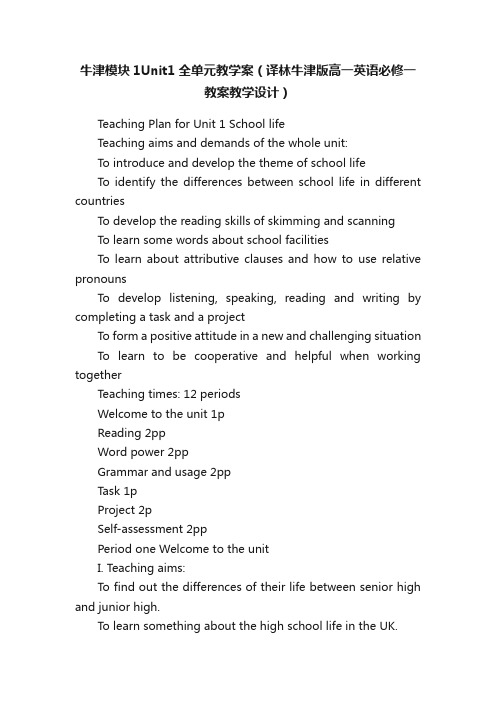
牛津模块1Unit1全单元教学案(译林牛津版高一英语必修一教案教学设计)Teaching Plan for Unit 1 School lifeTeaching aims and demands of the whole unit:To introduce and develop the theme of school lifeTo identify the differences between school life in different countriesTo develop the reading skills of skimming and scanningTo learn some words about school facilitiesTo learn about attributive clauses and how to use relative pronounsTo develop listening, speaking, reading and writing by completing a task and a projectTo form a positive attitude in a new and challenging situation To learn to be cooperative and helpful when working togetherTeaching times: 12 periodsWelcome to the unit 1pReading 2ppWord power 2ppGrammar and usage 2ppTask 1pProject 2pSelf-assessment 2ppPeriod one Welcome to the unitI. Teaching aims:To find out the differences of their life between senior high and junior high.To learn something about the high school life in the UK.To know how to get on well with high school life / study.To find out how an activity attracts the students and helps the studentsII. Teaching Procedures:Step 1 GreetingsStep 2. Warming up and Lead-in1. Let some students make a self-introduction.2. Say something about their junior high school life.Step 3. PresentationPair work: brain storm:When we are talking about our school life, what will we probably think of?Step 4 Comparison (Group work)Here are three pictures that show some aspects of school life in the UK. Please read the instructions, look at the pictures: what’s the difference between schools in China and the UK?Aspects In the UK In ChinaHuge campus and low-rise buildings We can see huge campus and low-rise buildings.It is the biggest difference from schools in China Schools in China usually have a large enough campus to make sure students have enough space to study and play in.But most school buildings are taller, at least three storeys.Lockers for every student There are rows of lockers by the classrooms for students to put their stationary, books, exercise-books and other belongings. Students bring what they need for lessons to school and then take it all back home after school. Most schools in china do not have equipment in the classroom.Fewer students in each class There are fewer students in a class, no more than 30 per class. There are usually more studentsin high school, perhaps 40 to 50 per class. Recently some school are beginning to limit the number of students in each class.At ease with our teacher Students have a close relationship with their teachers. They feel at ease and comfortable with them. It is similar in china. Nowadays, lots of teachers and students have established a good relationship with each other. They respect each other and work to gain a better understanding of each other.Step 5 DiscussionWhat kind of school activities do you enjoy?Do you know any further differences between the schools in the UK and China?What is your dream school life like?What do you think the teachers should be like?What do you think the students should be like?What do you think the relations between teachers and students should be like?Step 6 ExtensionWhat are the factors that will lead to the success of the further?Step 7 SummaryHomework1) Recall all the new words and expressions that appear in this unit.2) Write a short passage about your dream school. (100words)3) Preview the following lesson.Period two ReadingTeaching aims:1. To read a magazine article about school life in the UK.2. To learn to apply two basic reading skills: skimming andscanning.3. To learn some expressions about school life.Teaching procedures:Step 1 RevisionCheck the homework exercise.Step 2 PresentationYesterday discussed the differences between high schools in our country and the UK.Now we are going to read a magazine article which is written by an exchanging student. She has been studying in the UK for one year. Now she gives a clear brief introduction about her school life there.Before we read the article, we are going to learn the reading strategy: skimming and scanning. (P.3: Reading strategy) Skimming: to get a general idea of the article.Focus on the title, heading, captions, the first and last sentences of paragraphs, charts and pictures …Scanning: to locate specific information about an article.Look for key words and phrases, dates and words in bold, italics or capital letters…Step 3 Reading1. Skimming question:How does Wei Hua feel about her life in the UK?2. Scanning:1) What topics are mentioned in the WeiHua’s letter?(opt. are the following aspects of school life mentioned in the article?Teachers classmates friends subjects homework grades timetable activities school facilities host family food hobbies customs traditions festivals)2) Scan the passage and complete Part C1, C2 on page 4Step 4 Group workWhat’s the similarity and difference between the schools in China and the UK?★Aspects In the UK In ChinasimilaritydifferenceStep 5 Practice:Pair workNow you are a reporter from the school magazine, and have a chance to interview Wei Hua. What other information would you like to know about her life and study in the UK?Suppose your desk mate is Wei Hua, make a dialogue.Homework.1. Complete parts D and E2. Read the two articles in reading on pages 82 and 83 in wb and answers the questions below them.3. Daniel Adams will come to your school as an exchange student. Write a letter to him and introduce your school life to him.4. Preview the following lesson.Period three Language focusStep 1 Revision:1. Check the homework2. Complete the chart and retell the letter.On the first dayTeachers Mr. HeywoodMiss BurkeSize of a classroomSubjectsFoodWei Hua’s feelings and progressStep 2. Language focus1. Words:a) attend (join / join in / take part in )b) preparec) miss (missing / gone / lost)d) experiencee) informationf) sounds2. Phrases:a) for freeb) a bit / a littlec) as well as3. Sentences:a) Going to a British school for one year has been a very enjoyable and exciting experience for me.b) I do like eating.Step 5. Practice1. Complete wb A1, A2,2. Translation1)Jim加入了我们的讨论之列。
- 1、下载文档前请自行甄别文档内容的完整性,平台不提供额外的编辑、内容补充、找答案等附加服务。
- 2、"仅部分预览"的文档,不可在线预览部分如存在完整性等问题,可反馈申请退款(可完整预览的文档不适用该条件!)。
- 3、如文档侵犯您的权益,请联系客服反馈,我们会尽快为您处理(人工客服工作时间:9:00-18:30)。
Brainstorming
• 1. What is the biggest difference between this school and your junior middle school? • 2. How do you feel about your new life here in the first few days?
Advance With English
Module 1 Teenage Experiences
Unit 1 School Life
南京师大附中
Teaching schedule
Welcome to the unit (1) Lead-in
Reading (2)
Reading strategy / Language focus Vocabulary
Problem solving --Feel free to ask for help
• • • • Make up a conversation 1. get to the school medical center 2. buy food in the school canteen 3. go to the school Lost and Found Office and look for a lost watch • 4. fix a date with your teacher for a face-to-face talk about one of your problems
new life
Listening – How to ask for help
• • • • • Listen and find out 1. Where? 2. What? 3. How? (Listen and follow, if necessary)
• One possible conversation: • Jack: Excuse me, do you know where the police station is? • Woman : I’m sorry. I don’t. I’m not from around here. • Jack: OK, thanks anyway. • Mary: Hi, Jack! How is it going? • Jack: Not too good. I lost my wallet and it had all my ID and money. • Mary: Oh, no! • Jack: So, how do I get to the police station from here?
More information -- Differences in education systems
• Read the following information and learn more…
•1. pre-school education (2----5years old) •(UK) play school / nursery school •(China) kindergarten
• Mary: It’s easy. Go along Main Street. When you get to King Street, turn left. It’s right next to the post office. You can’t miss it. • Jack: OK. Go up this street and turn left at King Street. It’s beside the post office. • Mary: That’s it. • Jack: Thanks, Mary. • Mary: No problem.
Speaking --sharing your experiences
• Please share with the class: • Besides “getting lost”, what other problems did / do you meet with in the new school? • …
Further discussion (group work) -- Make a comparison
• Discuss with your group. • Any other differences? • 1. Discuss in a group of 4 (timer, note-maker, reporter, etc.) 2. report to the whole class (Which group did best? / How to improve)
Discussion (pair work) -- Talk about differences
• Talk and find out • What is different? • 1.Talk about the 4 pictures on page one and find out the differences between British and Chinese high schools • 2. Complete the chart after your discussion
Word focus
• You may use the following words in your discussion. • campus • locker • at ease
in the UK
campus lockers class size Teacher and student
in China
Unit Word power (1) (11 Grammar and usage (2) Grammar Problem-solving -12) Task (1+1/2)
Project (2) Self-assessment (1)
Evaluation
Integrated sk
